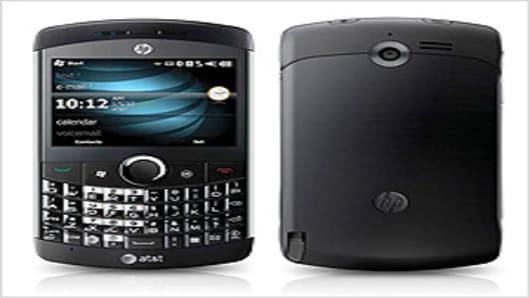In its bid to take on Apple and Google in smartphones, Hewlett-Packard won't use Microsoft's Windows Phone 7 software.
Instead, HP Executive Vice President Todd Bradley told me that the PC giant will exclusively use its webOS software, which it got when it closed its Palm acquisition three weeks ago. Not that Microsoft is completely striking out with HP—Bradley also said definitively for the first time that HP will build a tablet computer based on Microsoft's Windows 7.
Bradley's comments are some of the clearest signals HP has given about its plans for the high-growth smartphone market. When I first got the call from HP a couple of months ago about its plans to acquire Palm, Chief Strategy Officer Shane Robison made a point of reminding me that HP is Microsoft's biggest customer, and that HP would continue to have a good relationship with Redmond. In his early comments about webOS, HP CEO Mark Hurd talked more about using it in printers than phones.
But it seems that HP is betting the farm on webOS in phones after all. In my conversations with HP executives, they sound determined to use HP's heft to make Palm into a top-tier smartphone platform on par with Apple's iOS and Google's Android.
To do that, HP will have to convince wireless carriers to distribute and market webOS handsets, and get application developers who are flocking to iPhone and Android to spend some time building apps for webOS as well.
It would have been easy for HP to try to please everyone and build Microsoft-based smartphones for businesses and webOS smartphones for consumers—but HP seems to have realized that strategy would have doomed webOS to second-tier status. If HP wouldn't even fully commit to its own OS, why should anyone else?
There are implications here for not only Microsoft, but also rivals Apple, Google and Research in Motion.
Microsoft: With HP shunning Windows Phone 7 and Dell already building phones based on Google's Android OS, it's clear that Redmond can't count on its old friends in the PC business to carry the banner for its new Windows Phone 7 OS due this summer. (This might explain why the first phones with Win Phone 7 will come from Asian manufacturers Samsung, LG and Asus.)
That means Microsoft has an even slimmer margin of error in Win Phone 7's first year—it will need to prove its platform is top-notch if it's going to convince top-tier handset OEMs to crank out sexy hardware and lure developers, too.
Apple and Google: Innovation wise, the smartphone platform market lately has been a two-horse race between iPhone and Android. (RIM sells a lot of phones, but its platform needs work.) HP's webOS threatens to complicate things now. Former Apple hardware chief Jon Rubinstein is now heading HP's mobile efforts, and now he's got deep pockets.
RIM: RIM's always been great at e-mail and great at building phones with solid voice capabilities. The company's biggest weakness is probably its OS platform. It's OS 6 platform, which is supposed to address those issues, had better be good—because you can be sure HP will be coming after RIM's core corporate customers as well as consumers.
Questions? Comments? TechCheck@cnbc.com


